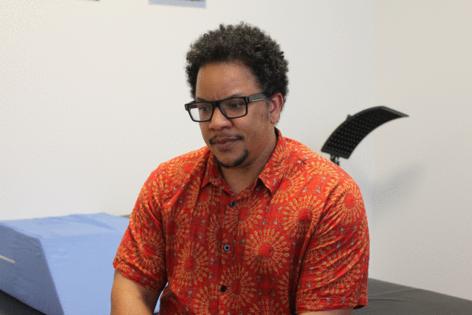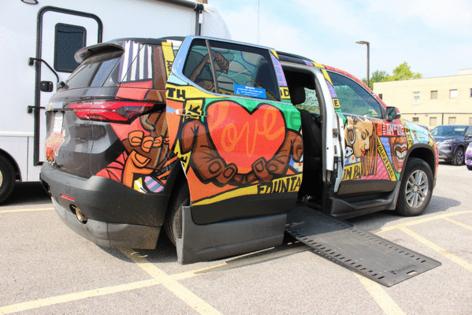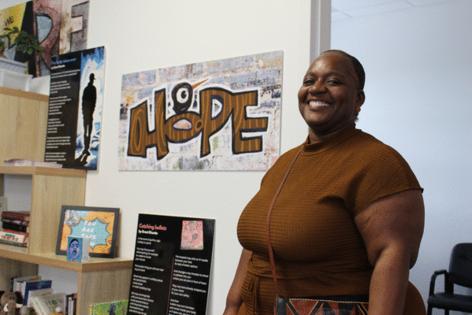Trump decried crime in America, then gutted funding for gun violence prevention
Published in Political News
ST. LOUIS — Violent crime was already trending down from a COVID-era spike when President Donald Trump presented a picture of unbridled crime in America on the campaign trail in 2024. Now his administration has eliminated about $500 million in grants to organizations that buttress public safety, including many working to prevent gun violence.
In Oakland, California, a hospital-based program to prevent retaliatory gun violence lost a $2 million grant just as the traditionally turbulent summer months approach. Another $2 million award was pulled from a Detroit program that offers social services and job skills to young people in violent neighborhoods. And in St. Louis, a clinic treating the physical and emotional injuries of gunshot victims also lost a $2 million award.
They are among 373 grants that the U.S. Department of Justice abruptly terminated in April. The largest share of the nixed awards were designated for community-based violence intervention — programs that range from conflict mediation and de-escalation to hospital-based initiatives that seek to prevent retaliation from people who experience violent injuries.
Gun violence is among America’s most deadly public health crises, medical experts say.
Among programs whose grants were terminated were those for protecting children, victims’ assistance, hate-crime prevention, and law enforcement and prosecution, according to an analysis by the Council on Criminal Justice, a nonpartisan think tank. The grants totaled $820 million when awarded, but some of that money has been spent.
“Not only are these funds being pulled away from worthy investments that will save lives,” said Thomas Abt, founding director of the Violence Reduction Center at the University of Maryland, “but the way that this was done — by pulling authorized funding without warning — is going to create a lasting legacy of mistrust."
The Justice Department “is focused on prosecuting criminals, getting illegal drugs off the streets, and protecting all Americans from violent crime,” according to a statement provided by agency spokesperson Natalie Baldassarre. “Discretionary funds that are not aligned with the administration’s priorities are subject to review and reallocation, including funding for clinics that engage in race-based selectivity.”
The Council on Criminal Justice analysis of the terminated grants found that descriptions of 31% of them included references to “diversity,” “equity,” “race,” “racial,” “racism,” or “gender.”
Baldassarre’s statement said the department is committed to working with organizations “to hear any appeal, and to restore funding as appropriate.” Indeed, it restored seven of the terminated grants for victims’ services after Reuters reported on the cuts in April.
But the cuts have already prompted layoffs and reductions at other organizations around the country. Five groups filed a lawsuit on May 21 to restore the grants in their entirety.
Joseph Griffin, executive director of the Oakland nonprofit Youth Alive, which pioneered hospital-based violence intervention in the 1990s, said his organization had spent only about $60,000 of its $2 million grant before it was axed. The grant was primarily to support the intervention program and was awarded for a three-year period but lasted just seven months. The money would have helped pay to intervene with about 30 survivors of gun violence to prevent retaliatory violence. He’s trying to find a way to continue the work, without overtaxing his team.
“We will not abandon a survivor of violence at the hospital bedside in the same way that the federal government is abandoning our field,” he said.
The cuts are also hitting St. Louis, often dogged by being labeled one of the most dangerous cities in America. The city created an Office of Violence Prevention with money available under former President Joe Biden, and various groups received Justice Department grants, too.
Locals say the efforts have helped: The 33% drop in the city’s homicide rate from 2019 to 2024 was the second-largest decrease among 29 major cities examined by the Council on Criminal Justice.
“I don't think there's any doubt that there's some positive impact from the work that's happening,” said University of Missouri-St. Louis criminologist Chris Sullivan, who received a grant from the Justice Department to assess the work of the city’s new Office of Violence Prevention. That research grant remains in place.
But the Justice Department slashed two other grants in St. Louis, including $2 million for Power4STL. The nonprofit operates the Bullet Related Injury Clinic, dubbed the BRIC, which provides free treatment for physical and mental injuries caused by bullets.
The BRIC had about $1.3 million left on its grant when the award was terminated in April. LJ Punch, a former trauma surgeon who founded the clinic in 2020, said it was intended to fund a mobile clinic, expand mental health services, evaluate the clinic’s programs, and pay for a patient advisory board. The BRIC won't abandon those initiatives, Punch said, but will likely need to move slower.
Keisha Blanchard joined the BRIC’s advisory board after her experience as a patient at the clinic following a January 2024 gun injury. Someone fired a bullet into her back from the rear window of a Chevy Impala while Blanchard was out for a lunchtime stroll with a friend from her neighborhood walking group. The shooting was random, Blanchard said, but people always assume she did something to provoke it. “It’s so much shame that comes behind that,” she said.
The 42-year-old said the shooting and her initial medical treatment left her feeling angry and unseen. Her family wasn’t allowed to be with her at the hospital since the police didn’t know who shot her or why. When she asked about taking the bullet out, she was told that the common medical practice is to leave it in. “We're not in the business of removing bullets,” she recalled being told. At a follow-up appointment, she said, she watched her primary care doctor google what to do for a gunshot wound.
“Nobody cares what's going to happen to me after this,” Blanchard recalled thinking.
Before she was referred to the BRIC, she said, she was treated as though she should be happy just to be alive. But a part of her died in the shooting, she said. Her joyful, carefree attitude gave way to hypervigilance. She stopped taking walks. She uprooted herself, moving to a neighborhood 20 miles away.
The bullet stayed lodged inside her, forcing her to carry a constant reminder of the violence that shattered her sense of safety, until Punch removed it from her back in November. Blanchard said the removal made her feel “reborn.”
It’s a familiar experience among shooting survivors, according to Punch.
“People talk about the distress about having bullets still inside their bodies, and how every waking conscious moment brings them back to the fact that that's still inside,” Punch said. “But they're told repeatedly inside conventional care settings that there's nothing that needs to be done.”
The Justice Department grant to the BRIC had been an acknowledgment, Punch said, that healing has a role in public safety by quelling retaliatory violence.
“The unhealed trauma in the body of someone who's gotten the message that they are not safe can rapidly turn into an act of violence when that person is threatened again,” Punch said.
Community gun violence, even in large cities, is concentrated among relatively small groups of people who are often both victims and perpetrators, according to researchers. Violence reduction initiatives are frequently tailored to those networks.
Jennifer Lorentz heads the Diversion Unit in the office of the St. Louis Circuit Attorney, the city’s chief prosecutor. The unit offers mostly young, nonviolent offenders an opportunity to avoid prosecution by completing a program to address the issues that initially led to their arrest. About 80% of the participants have experienced gun violence and are referred to the BRIC, Lorentz said, calling the clinic critical to her program’s success.
“We're getting them these resources, and we're changing the trajectory of their lives,” Lorentz said. “Helping people is part of public safety.”
Punch said the BRIC staffers were encouraged during the Justice Department application process to emphasize their reach into St. Louis’ Black community, which is disproportionately affected by gun violence. He suspects that emphasis is why its grant was terminated.
Punch likened the grant terminations to only partially treating tuberculosis, which allows the highly infectious disease to become resistant to medicine.
“If you partially extend a helping hand to somebody, and then you rip it away right when they start to trust you, you assure they will never trust you again,” he said. “If your intention is to prevent violence, you don't do that.”
_____
©2025 Kaiser Health News. Visit khn.org. Distributed by Tribune Content Agency, LLC.






























































Comments